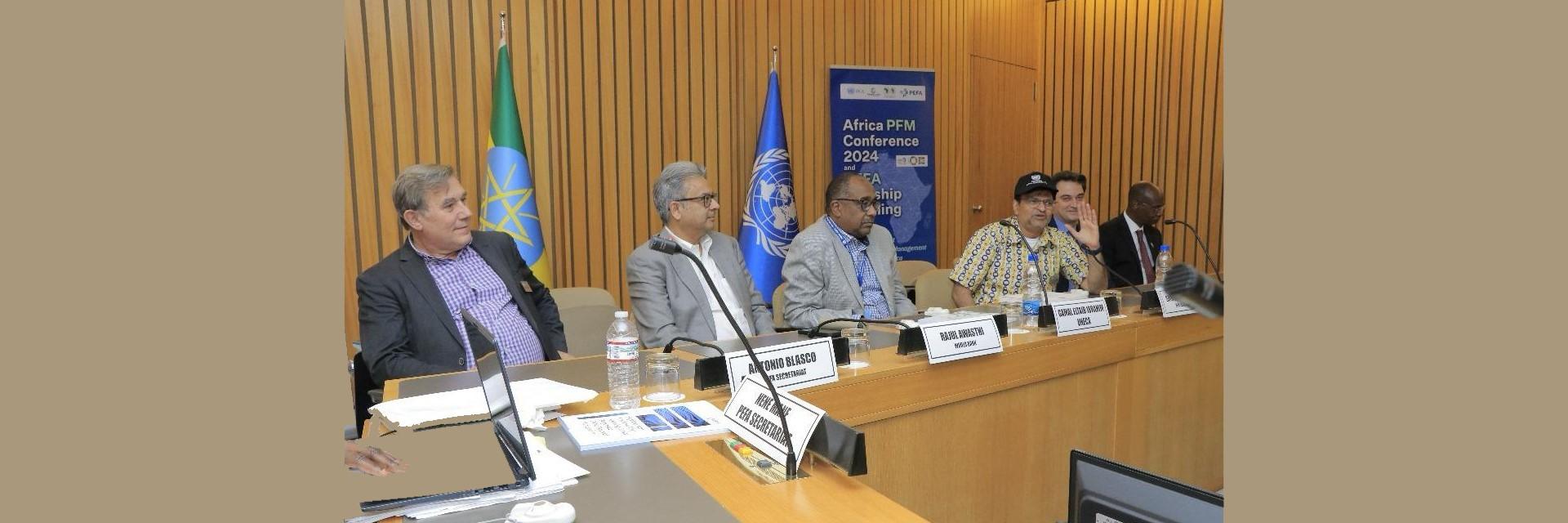Addis Ababa, Ethiopia, 14 November 2024 – Scores of stakeholders concluded the Africa Public Financial Management (PFM) Conference and Public Expenditure and Financial Accountability (PEFA) training, held from November 11 to 15 in Addis Ababa. The twin events aimed to unite policymakers, practitioners and experts across Africa around enhancing the efficiency, accountability, and transparency of public resource management.
“Public financial management is critical for governments to deliver effective services while maintaining fiscal discipline. The PEFA framework serves as a standardized assessment tool that empowers governments and financial institutions to evaluate and improve their financial management systems, aligning them with international best practices,” said Zuzana Schwidrowski Director of the ECA’s Macroeconomic, Finance and Governance Division at the opening.
The events were held against the backdrop of several efforts, including the implementation of the recommendations of a 2015 ECA-AUC pathbreaking report led by former South African President Thabo Mbeki, whose key finding was that Illicit financial flows from Africa were significant, in the order of US$50 billion annually (in 2015 prices)”
The main drivers identified by the authors of the report were weaknesses in Africa’s public finance management systems, global finance governance architecture, and the existence of an ecosystem of enablers. The report emphasized that “global challenges require global solutions and collaboration between African countries and advanced economies would be needed.”
“We are looking at the problem from two perspectives: within Africa and within the global arena, which facilitates the loss of resources. Both aspects share the common challenge of skewed incentives that encourage this problem to persist,” said Ms. Schwidrowski.
In May 2022, the ECA Conference of African Ministers of Finance, Planning and Economic Development called on the world to consider the establishment of an inclusive and fair convention on international tax cooperation to enhance the efforts of developing countries to expand their fiscal space. This can be achieved through a fairer global financial architecture that promotes inclusive and effective international tax cooperation at the UN.
“This call is already being responded to globally, with the terms of reference of the process for establishing the framework convention agreed only last August,” she said.
In addition to illicit financial flows, profit shifting, a practice prevalent among multinational corporations undermines Africa’s efforts for enhanced domestic resource mobilization. Furthermore, the persistent and significant leakages in fiscal systems continue to reduce fiscal space and divert resources away from financing important development initiatives.
Touching on the high level of public debt facing several African frontier markets and the unprecedented outlay on debt servicing since a significant portion was secured through Eurobonds, Ms. Schwidrowski said the high borrowing and servicing costs are closely associated with very low credit ratings that most African sovereigns received for three major rating agencies.
“ECA has been working with the AUC to establish an African Credit Rating Agency as part of the efforts to improve the treatment of African countries in the credit rating arena,” she added.
In addition, ECA supports member States to strengthen capital markets where they exist, and develop them where they are in their infancy, to facilitate access to domestic and international resources.
For his part, Srinivas Gurazada, Head of the PEFA Secretariat, said, "Africa is not merely a part of the world; it is its future. The continent's success hinges on effective management of public finances, and the 2024 Africa PFM Conference in Addis Ababa, co-hosted with esteemed partners, is a pivotal step towards ensuring that Africa thrives and contributes to global prosperity.”
“As we unveil the “groundbreaking PEFA Climate framework in Addis Ababa, we take a monumental step towards integrating gender and climate considerations into government budgets. This initiative marks the dawn of a new era for Africa and the world, where financial accountability becomes synonymous with climate responsiveness," He added.
The conference's primary objective was to facilitate a comprehensive dialogue on enhancing PFM systems through using diagnostic tools and the PEFA framework. By bringing together a diverse array of stakeholders, including government officials, international experts, and representatives from financial institutions, the event aimed to promote knowledge sharing and collaboration.
In addition, the conference sought to establish a strong network among professionals in the PFM and PEFA fields, laying the groundwork for ongoing cooperation and support. The workshops and discussions were designed to highlight the latest trends and challenges in PFM, while also identifying opportunities for reform and capacity building.
“ECA would like to thank the World Bank’s Governance Department for the support in strengthening financial accountability among Member States – we look forward to more collaboration,” said ECA’s Gamal Eltaib Ibrahim at the training's conclusion on Friday.
Note to editors:
-
Among other related efforts, ECA’s premier Economic Governance Report explored the different ways financial resources illicitly flow out of Africa, identifying the systemic weaknesses and pointing out specific recommendations for curbing them.
-
The second edition of the Economic Governance Report was focused on exploring the leakages of financial resources by African countries through the provision of tax expenditures, that is tax incentives mostly aiming to attract foreign direct investment. The findings here were staggering, not only showing weaknesses in the tax expenditure governance but also the significant resources lost through this avenue unproductively.
-
ECA has also looked at the issue of lost resources and how African countries can recover them, resulting in recommendations for a holistic and coordinated global framework on Asset Recovery. The Adoption of the framework would help African countries significantly strengthen their currently highly depleted fiscal space.
Issued by:
Communications Section
Economic Commission for Africa
PO Box 3001
Addis Ababa
Ethiopia
Tel: +251 11 551 5826
E-mail: eca-info@un.org

